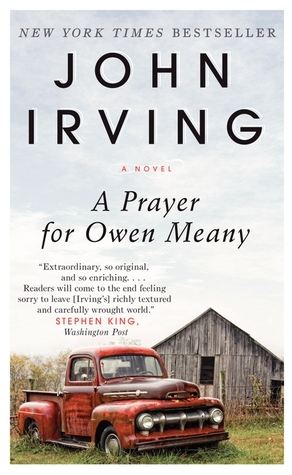Review: John Irving’s “A Prayer for Owen Meany”
by Miles Raymer
I already wish I could get back at least a portion of the many hours I spent wading through this novel, so I’m not going to waste much time reviewing it. Despite containing some moments of keen intellectual insight and a handful of endearing events and characters, John Irving’s A Prayer for Owen Meany is among the worst books I’ve ever read. From plenty of legitimate perspectives, Owen Meany is a “great” novel, one deserving the praise it often receives. But I found it overwrought, self-serving, and often yawn-inducing. I’m willing to admit that my aversion to Owen Meany might reveal more about my personal biases than the quality of Irving’s talent, but that doesn’t change my perspective.
Owen Meany gets off to a promising start, introducing two young boys whose lives become tragically intertwined by events beyond their control. Meany, the physically diminutive but spiritually robust protagonist, is both likable and ornery. But his story starts to derail when he becomes tormented by hallucinatory glimpses of his impending and untimely fate. Assuming with unquestioning faith that these visions come directly from God, Owen takes up a queer strain of idiosyncratic fundamentalism. Weary platitudes about not fully understanding “God’s will” or “His plan” abound.
Though I failed to comprehend the value of this novel’s central focus, there were also plenty of ancillary qualities I also disliked. Irving spends page after page describing events and characters that are of little significance for the story as a whole, giving the impression that he doesn’t properly edit his work or mind wasting his reader’s time. He sets up little vignettes and then comes back to them over and over, as if trying to remind us how clever he is for having thought them up in the first place. Instead of creating the sense of meaningful, cyclical resonance I’m sure he was going for, Irving comes off as not being able to distinguish between an amusing but irrelevant anecdote and a potentially rich story component.
All of the above would be forgivable if not for Owen Meany’s most damning quality: its insufferable and petulant moralizing. I usually relish an author who takes up moral issues directly, but this novel prompted the opposite reaction. Although virtually non-existent in the opening chapters, Owen Meany’s latter half indulges in the worst kinds of golden age thinking, lamenting the loss of “simpler” and “less corrupt” times in American life and government. Irving’s narration slowly unravels in lengthy and repetitive screeds about the injustices of the Vietnam War, the failures of the American Peace Movement, and Owen Meany’s increasingly idiotic preparations for a death he has no reason to believe in––except belief itself.
The preordained arrival of circumstances in which Meany’s crazy notions are revealed as necessary for the execution a singular moment of heroism is, in my point of view, distressingly stupid. By novel’s end, Irving has made the reader so painfully aware of Meany’s fate that it has almost no emotional impact, proving that liberal foreshadowing without restraint is a sure way to kill any good story. Ultimately, Irving (mis)uses Meany as a heavy-handed vindication of irrational, faith-based behavior––something a reader like me will not tolerate. Because Meany’s fate is sealed, there is nothing morally complex about his story. His imaginative life is stifled by an inability to simulate multiple realities and struggle to choose some over others, a process that is the lifeblood of great moral fiction.
Owen Meany is the reason, our narrator claims, that he believes in God. I can’t argue with the assertion that someone having witnessed this tale in real life would probably come to the same conclusion: God exists and speaks, albeit obliquely, to and through Owen Meany. But the fact that Owen Meany is a novel––a contrivance of human ideas and desires––reduces this message to a mess of petty wish fulfillment, neither interesting nor profound. The world is not a place that confirms the faith of people like Owen Meany, but rather one where religious delusions often result in harsh awakenings and sometimes in violent tragedies. People who believe they are instruments of God are not saviors––they are dangerous. To suggest otherwise, even from a safe fictional distance, is misleading and potentially harmful.
Readers looking to understand why John Irving is considered a literary heavyweight should read The Cider House Rules, which is exceptional. Do not give Owen Meany a second glance.
Rating: 2/10

There is no harm in this novel. I have read all of Irving’s books and this is the one I have re-read and found something new in every time. It is painful to read and seeing Owen’s loss coming makes it more so. To conflate a novel with real life reveals your limitations more than anything else. I don’t share Owen’s world view. I don’t need to. He isn’t a real person. I am saddened by my own lack of any faith, but it is what it is. Surely you need not fear characters in novels or Shakespeare might shake you to your core. Real people are much more worthy of concern. I will return to this book again and tell anyone who asks that it is worth their time. If for nothing else, his take on Catholic church ruining Owen’s reverie with all their ritual and rehearsed lines. Amen to that as one girl who remembers repeating words of no real meaning.